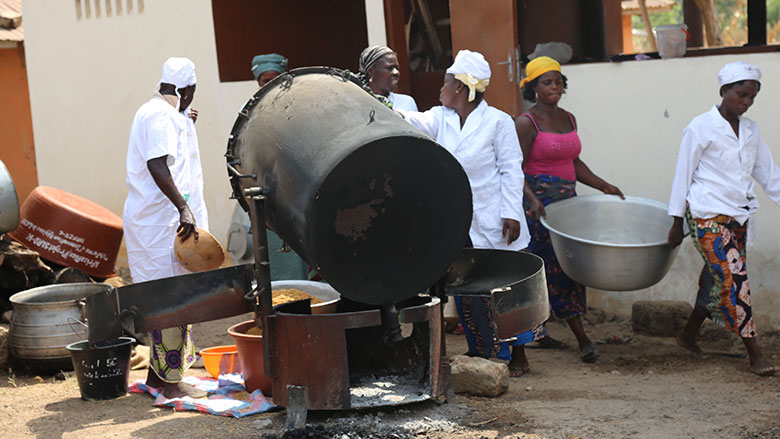Modern equipment leads to better quality rice
Women rice parboilers in Collines are particularly proud of the project’s installation of a rice color sorting machine to improve rice quality. Paulin Honaï, Manager of the Center for Final Processing and Distribution, stresses that “it has revolutionized our work. The sorting machine allows us to have perfect rice, with no waste, and to guarantee the quality of our brand on the market.”
Set up at the Glazoué Center for Final Processing and Distribution, the machine is jointly managed by UFER-C and the Collines Regional Union of Rice Producers (UNIRIZ). Most paddy rice grown in the Department is therefore sent to this mini-processing plant to be parboiled and sold under the brand name Saveur des Collines.
For Bertin Adéossi, Coordinator of the Framework Program to Support Agricultural Diversification (ProCAD), another advantage of this modernization is its elimination of the arduous phase of manual sorting. He explains that “in the past, we had to get at least four women to manually sort a 100 kg-bag, which took all day. By comparison, the sorting machine we have installed produces 1.4 metric tons per hour, allowing the union to process close to 10 metric tons of rice per week.”
Production has steadily increased from 32 metric tons in 2016 to 201 metric tons in 2017, and 303 metric tons in 2018. The projected figure for 2019 is 800 metric tons. This performance is reflected in sales revenue, which has risen from CFAF 33 million to almost CFAF 80 million between 2017 and 2018.
The center’s next goal? To increase its husking capacity, which currently covers a mere 10% of the rice produced in Collines. UNIRIZ President Faustin Assomavè notes with regret that “although we have the color sorting machine, we have had production problems since the closing of the public rice-processing plant in Glazoué. At the moment, many producers and women rice parboilers are forced to sell off their paddy rice or parboiled rice to Nigerian merchants.”
Implemented in four West African countries (Benin, Guinea, Niger, and Togo), WAAPP seeks to generate and accelerate the adoption of improved technologies in the agricultural sectors. In Benin, WAAPP has received $20 million in funding from the International Development Association (IDA). In July 2019, 753,387 producers, 40% of whom were women, received direct assistance from the project.
The center’s next goal? To increase its husking capacity, which currently covers a mere 10% of the rice produced in Collines. Photo: Gnona Afangbedji, World Bank 


